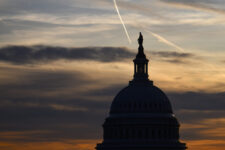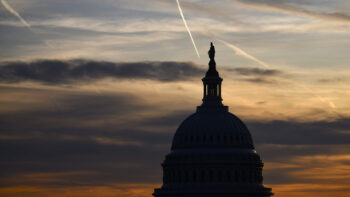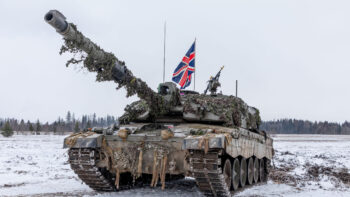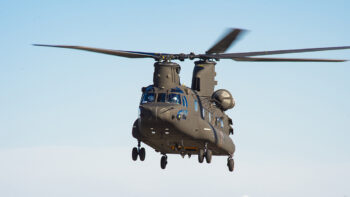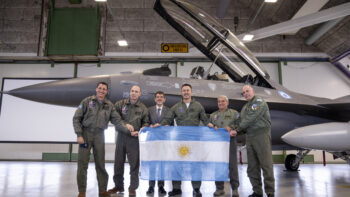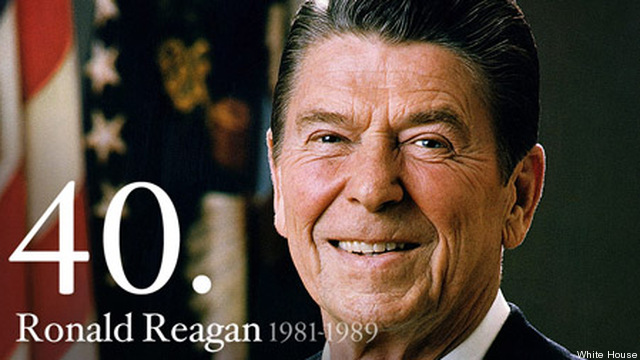
Less than three weeks from today, a four-star-studded convoy of Obama administration appointees will head west to the modern GOP’s most hallowed ground, the Ronald Reagan Library – and burial site – in Simi Valley, Calif. The one-day conference is a rare attempt to build a national consensus on defense both between the parties and, just as important, between defense hawks and deficit hawks within Reagan’s own party.
It’s a hell of a guest list. Attendees at the “Reagan National Defense Forum” will hear from Defense Secretary Chuck Hagel and senior leaders from the services, including Gen. Martin Dempsey, Adm. Jonathan Greenert, and Adm. William McRaven, the chiefs of the Joint Staff, Navy, and Special Operations Command respectively; Air Force Combat Command chief Gen. Michael Hostage; and Army Secretary John McHugh. Defense industry attendees include Northrop Grumman CEO Wes Bush, EADS North America CEO Sean O’Keefe, and Raytheon CEO Bill Swanson, as well as the new CEO of the Business Executives for National Security, retired Air Force Chief of Staff Gen. Norton Schwartz. And then there are too many thinktankers and legislators to list.
While the people driving the event are mostly Republicans, the organizers, speakers, and honorees range from the top Democrats on both the Senate and House Armed Services Committees, Carl Levin and Adam Smith; Sec. Hagel, a Republican seen by many Republicans as a traitor; former Secretary Robert Gates, who served both Bush and Obama; to former Navy Secretary John Lehman, one of the most hawkish members of the not particularly dovish Reagan administration.
House Armed Services chairman Buck McKeon, a Californian, chairs the “honorary steering committee. “My role has been talking to people to ask ’em to participate,” McKeon told me in an interview. “Gen. Dempsey to be the keynote speaker, Sec. Hagel to speak, Sen. Levin and Sec. Gates to be the honorees.” While others attributed the concept for the conference to McKeon, he gave the credit to two former staffers: “it was Roger [Zakheim]’s and Bob Cochran‘s idea,” he said. “We’ve got defense industry people, we’ve got military people, and we’ve got members of Congress – both the House and Senate – and I’m hopeful that it’ll be… an annual event.”
After two years of budgetary gridlock and anarchy, I asked McKeon, is the idea not just to bring Democrats and Republicans together outside the poisonous atmosphere of Washington, but also to have pro-defense Republicans and the Tea Party come together at Reagan’s shrine?
“That’s not totally the objective,” McKeon answered with a chuckle, “because it is bipartisan… but I think it will think it will be a very strong reminder of the way Reagan is revered within the party, and one of his stalwart positions was a strong national defense. So I think the location is important for that reason.”
A strong defense and fiscal responsibility are both equal parts of the Reagan legacy, McKeon argued, but the fiscal side “has gotten way out of proportion.”
In fact, since deficits more than doubled under Reagan while defense spending spiked, Reagan arguably put defense first to such extent that the Tea Party probably wouldn’t like him much if he were president today. But after a quarter of a century, even Democrats have largely forgotten they once hated Reagan because he provoked those nice Soviets by calling them an “evil empire,” making jokes about bombing Russia, and developing missile defenses). “What Would Reagan Do?” (WWRD for short) shows up on T-shirts and coffee mugs, and it’s so hard for any Republican to reject any part of Reagan’s legacy that saying, as Sen. Kelly Ayotte did, that “he would be horrified” by sequestration cuts is pro-defense Republicans’ favorite club against the deficit hawks.
“Republicans [have] always been strong proponents of national defense,” McKeon told me, “[but] since the 2010 election we’ve had Republicans that came to town saying we need to cut defense more. That’s something that Republicans basically haven’t done before. So I thought the Reagan Library was a very fitting setting for the kind of a conference we’re going to have.”
McKeon has no illusions that any one-day conference, however high-powered, will heal the breaches between or within the parties. But he thinks it’s a start at rescuing national security issues from the wreckage. “More than half of the members of Congress have never seen regular order,” McKeon said. “When I first came to Congress, we passed appropriations bills and we got our work done. It’s been a while since that happened. People just kind of figure now, we go through the year, we do a CR [continuing resolution], and we fight and eventually get some appropriations bills passed, and then a omnibus [appropriation] or do a CR for the whole year. That’s not the way government was intended to be.”
“I can’t control that,” McKeon said. “Defense is on the periphery of that [debate:] Some people were fighting over Obamacare, some were fighting over our debt and the problem we have with deficit spending. I’m more concerned about one issue and that is our national defense: our commitments around the world, the ability to keep our people safe, the ability to have our commerce travel freely on the oceans.”
“I just recently was reading a little out of the life of Carl Vinson, [a] staunch pro-Navy, pro-defense Democrat from the South who was the chairman of the Armed Services committee,” McKeon added. “The point that he was making was you have to have a strong military when your economy’s strong and you have to have a strong military when your economy is struggling, because the enemy always gets a vote.”
“They’re not going to wait until your economy is strong,” he said. “Quite the opposite.”
Pass a preemptive CR, deal with inflation and watch the debt limit: 3 tasks for Congress
John Ferrari and Elaine McCusker of AEI argue in this op-ed that Congress needs to act quickly to ensure American national security before getting bogged down in election season.
